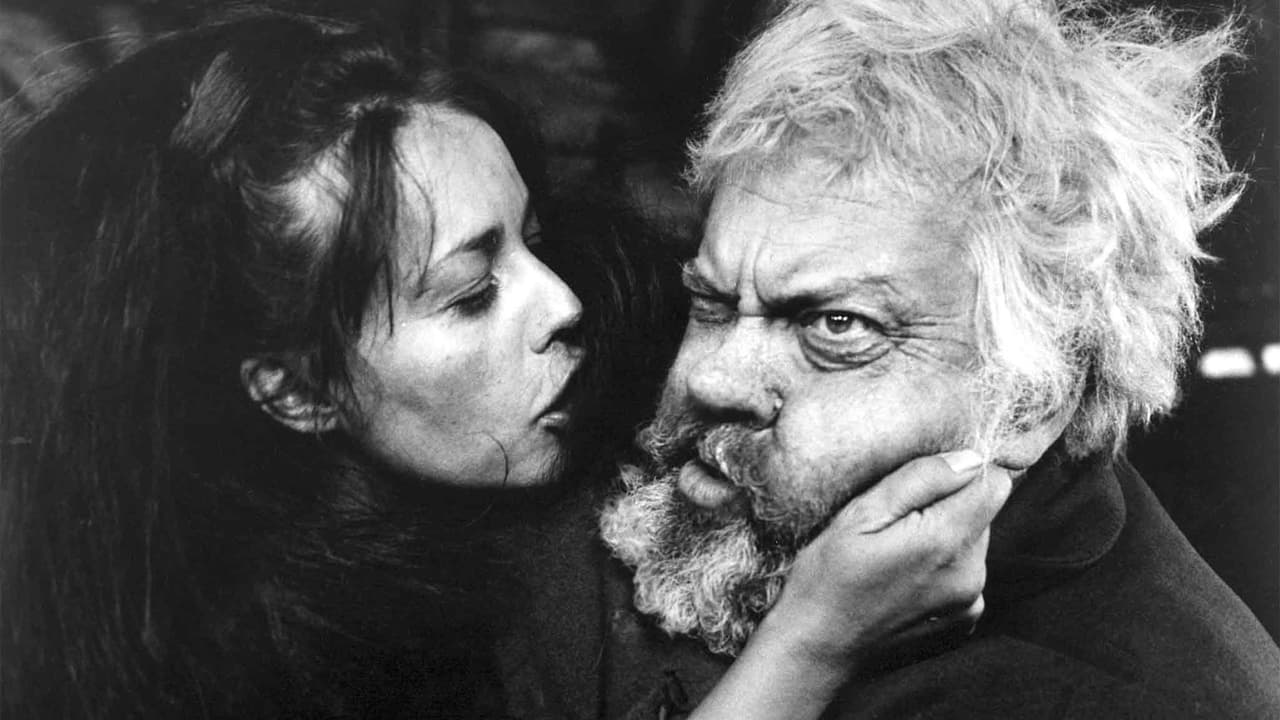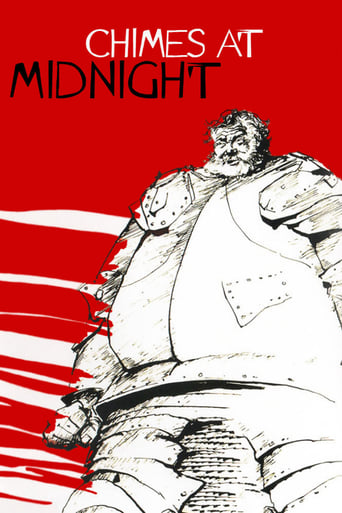

First of all, for those who have trouble following the full-on flowing Shakespearean dialogue, get the newly restored DVD from Criterion (2017) with subtitles. Plus many extras. Fans have waited decades for the delays caused by legal wrangling with the estate and other interlopers to finally be settled. I have a few of the earlier bootleg versions which were tolerable if you just had to see Chimes, but the Criterion is what so many fans have been waiting for. Beautiful.The image shown here is from an old bootleg. It would be nice if IMDb updated it from the Criterion release.At last, the movie Welles said he was most proud of, that he would present at the Gates of Heaven should he need make a submission for entering! I somehow landed in London 1969 and in the first weeks I was there we landed on the moon, people were gathered in little crowds around the old black and white tellies; and, Chimes at Midnight was showing. I was so overwhelmed I went back twice, and for decades it haunted me.Shakespeare on stage or in formal style movies seems so distant in time or across a distant divide; but Welles has culled out the meat from the various plays and joined them. The love between the youthful capricious Prince and the wise, vulnerable scoundrel fool is one I could put myself longingly into. How I wanted to share their adventures! Finally the Prince must become the King and put away childhood excess, even lose part of his heart. I always felt I had never grown into a man most of my life, longing for my own lost "Merrie England" of the soul. Ironically, only this year, in my 72nd year could I say that I had finally felt like I was now the man, the King. Yes it took that long! But the joke was on me! Before the year was out I had gotten excessively drunk or high, and twice pratfallen upon my face.This was the final sweetness to the tale: in one year I had gone from the Prince to the King (in my own mind of course), but the droll truth was that I had become Falstaff, the old fool! May your journey with the masterpiece be as special.
... View MoreOrson Welles was always good at Shakespeare and second only to Laurence Olivier, and in each Shakespeare he made he made it even better. You can see a very interesting line of maturing development through Macbeth and Othello to Falstaff, the final masterpiece - not even Laurence Olivier could make Shakespeare this good. And yet it has its minor flaws.My greatest pleasure and enjoyment, as I saw it now for the third time since the 60s, is above all the marvelous film and picture composition. Every scene could be seen as pictorially a masterpiece of its own. Orson Welles has created his film with an enormous load of experience from experimental cinematography through 30 years, and he seems to have learned everything. Usually in Shakespeare films there are long moments of doldrums but not here - the tempo is exceedingly efficient all the way, even in the calmer scenes. The virtuoso peak is of course the battle scenes in the middle of the film, comparable with Sergei Bondarchuk's overwhelmingness but here made more realistic and convincing in black and white. The mud is really muddy. It's also the point of the film's musical climax - here the music plays an important part of its own.The actors are also perfect every one, but here we come to the one minor detail. The diction is extremely important in Shakespare, the language is all, and if you muddle it all is lost. The best actor here is John Gielgud, who really understands his Shakespeare and makes him right, while the most difficult to understand is actually Orson Welles. His Falstaff is a little too bulky and fat, and his voice is many times lost in the flesh.Another wonderful thing, which gladdened me enormously, is the absolute faithfulness to realism. Welles has really tried to recreate medieval England, especially in the tavern scenes and above all the last one - you can really see how he enjoyed filming it. This faithfulness to style and realism makes the film outstanding in a way almost transcending all other Shakespeare films. Kenneth Branagh wallowed in transforming Shakespeare into any time, age and circumstance including the first world war, many others did even worse, while only Laurence Olivier was equally faithful to realism and style.In brief, it's a perfect film, and its minor flaws you easily forgive for its massive deserts. Only ten points is possible.
... View MoreI won't go into a long review here. Several of you have done admirably in recreating this marvelous presentation. It's Shakespeare but then it is not. Orson Welles did a masterful job of taking a favored comic character, Falstaff, and putting him on the screen as the center of attention, rather than a peripheral supporting character. The language sparkles all the way through. We manage to see his underlying power all the way through. He is a braggart and a bumbler and a real control freak. If you ever doubted that Orson Welles was one of our most magnificent actors, take a look at this. It is he who controls every scene while deadly battles and significant in-fighting occurs in the post Richard III era. I had never heard of this film. Excellent.
... View MoreWhen I saw the BBC productions of Henry IV both parts it became my favorite work of the Bard. Anthony Quayle was really great as Falstaff in both of those plays. So I was anxious to see how Orson Welles did in the part, especially as in his Chimes At Midnight it was Falstaff who became the centerpiece. I was not disappointed in the slightest.As Welles grew heavier and heavier as he grew older there were many jokes about his corpulence, Robin Williams started his career on them in Mork And Mindy. But the man who played Charles Foster Kane really grew into the role of Falstaff in two decades and a half. Quayle probably needed padding. I'm informed in Citadel Film series book on The Films Of Orson Welles that Welles actually had to diet.Way back in the day when Master Will Shakespeare wrote Henry IV and Falstaff proved so popular that he was brought back for The Merry Wives Of Windsor he did not have the advantage of movie closeups. Welles the director made very good use of his camera in his closeups of the main characters of Falstaff, Henry IV played by John Gielgud and Prince Hal played by Keith Baxter. I think the Bard would have approved, he had to write descriptive words to get his points across.Chimes At Midnight started as an edited play done by Welles condensing Shakespeare's work. The play never found an audience, but Welles believed in it and took a lot of roles in a lot of mediocre work as was his fashion to get his work filmed. The results paid off beautifully.Welles filmed this in Europe and it became an 'international' film in that overused word. Most of his cast was British and that also included Margaret Rutherford. She plays Mistress Quickly and that's a role far different from Miss Jane Marple. The most popular courtesan in Mistress Quickly's bawdy house is Jeanne Moreau from France. The work was mostly shot in Spain which was becoming a favored location for filming and they also contributed Fernando Rey in the role of Worcester, leader of the rebellion against Henry IV.Welles hits all the right emotions in the audience playing Falstaff. He's at once lovable, outrageous, and exasperating. Gielgud is also wonderful as the patient father waiting for his older son to just grow up and stop hanging around with disreputable types like Falstaff. That the father just happens to be King of England and the son the Crown Prince is almost an incidental to a universal story. That the story is universal is proved by the wonderful adaptation Gus Van Sant did with this same material in My Own Private Idaho. A chance to see Orson Welles intoning the Bard's words is never to be passed up.
... View More